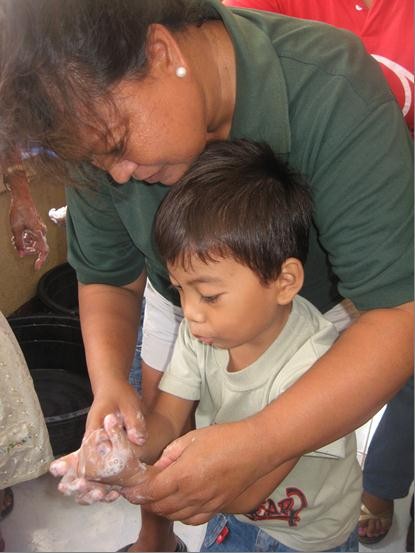
Florisa Sorre’s two children—Russel Franz, 6, and Sean Andrei, 5—had always been sickly. In fact, before village health workers visited the Sorre household, her son Sean Andrei had just been released from the hospital after being treated for dehydration from diarrhea.
Sorre knew she should wash her hands before eating, but she did not do it regularly. After health workers discussed the importance of handwashing, the 34-year-old mother finally understood her childrens' perennial health problems: “I didn't know that we can actually get sick if we do not wash our hands before eating or after using the toilet,” Sorre said.
Santa Rosa City, located close to Metro Manila, was in the headlines in 2009 because of the high number of H1N1 flu cases: 37, including 1 fatality. The city also registered high incidence of diarrhea among children under 5. Because of this, the city government decided to implement a campaign to promote the practice of handwashing, which has been shown to reduce the incidence of diarrhea by more than 45 percent. The USAID Philippine Sanitation Alliance assisted the city in developing the campaign using the USAID 10-Step Promotion Toolkit to improve hygiene and sanitation as a guide.
The team identified three lakeside villages—Caingin, Sinalhan and Tagapo—which had a combined total of 633 cases of diarrhea in 2009 among children up to 5 years old. The team conducted a baseline survey, prepared a promotion plan, and trained health workers and midwives to implement a campaign to increase the percentage of mothers who could cite at least two ways to prevent diarrhea. A post-campaign survey showed that over 80 percent of target mothers could now cite two or more ways to prevent diarrhea, an increase of 40 percentage points from the baseline data. Likewise, the number of mothers who could cite handwashing as one of the most effective ways to prevent diarrhea increased by 37 percentage points to an awareness level of just over 70 percent.
The success of the campaign encouraged the city to implement a city-wide handwashing program to cover all villages, restaurants and schools. To further support the program, the City Council passed an ordinance in October 2010 requiring all public re-strooms to provide soap and water—the first such city ordinance in the country.







Comment
Make a general inquiry or suggest an improvement.